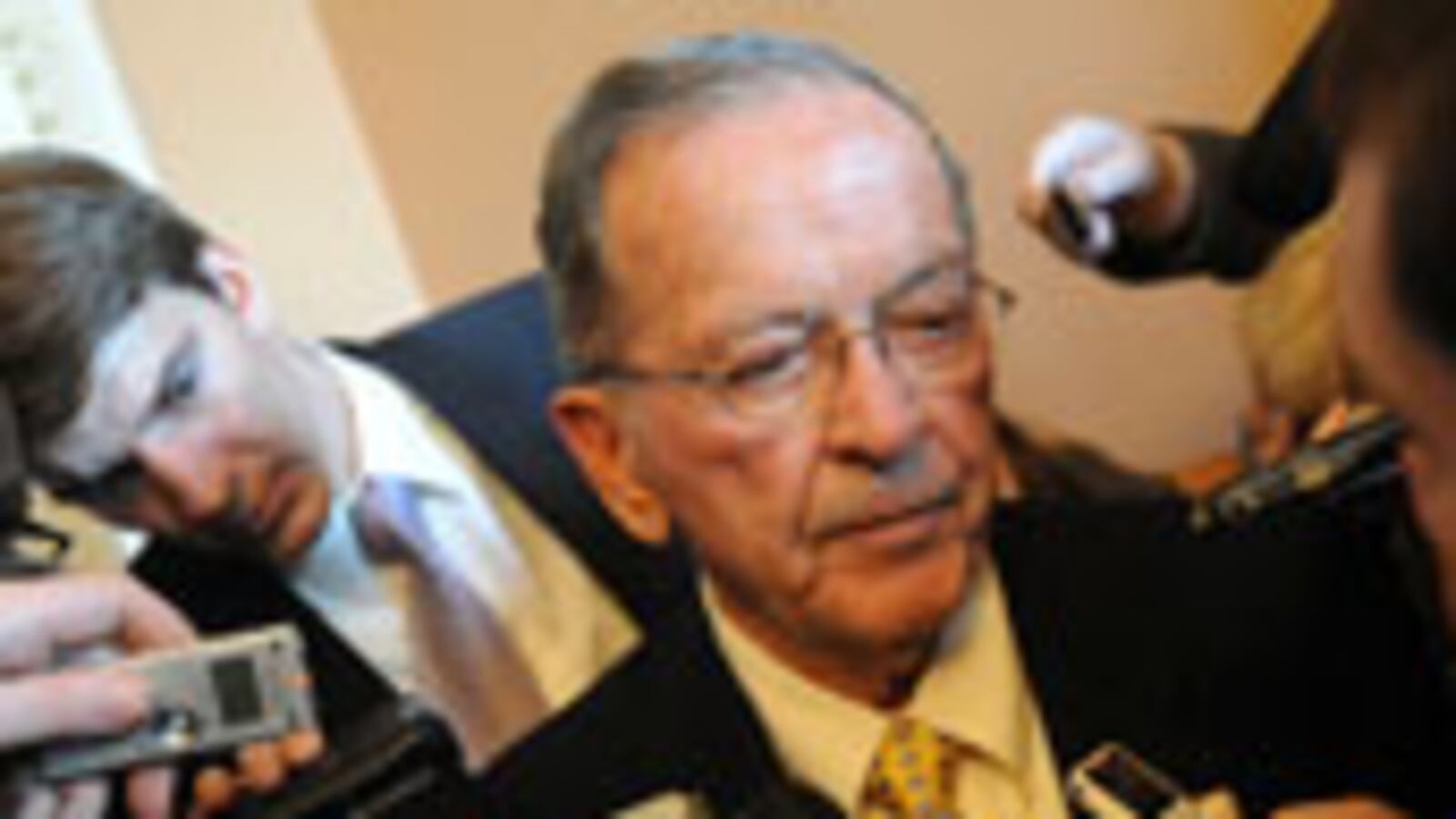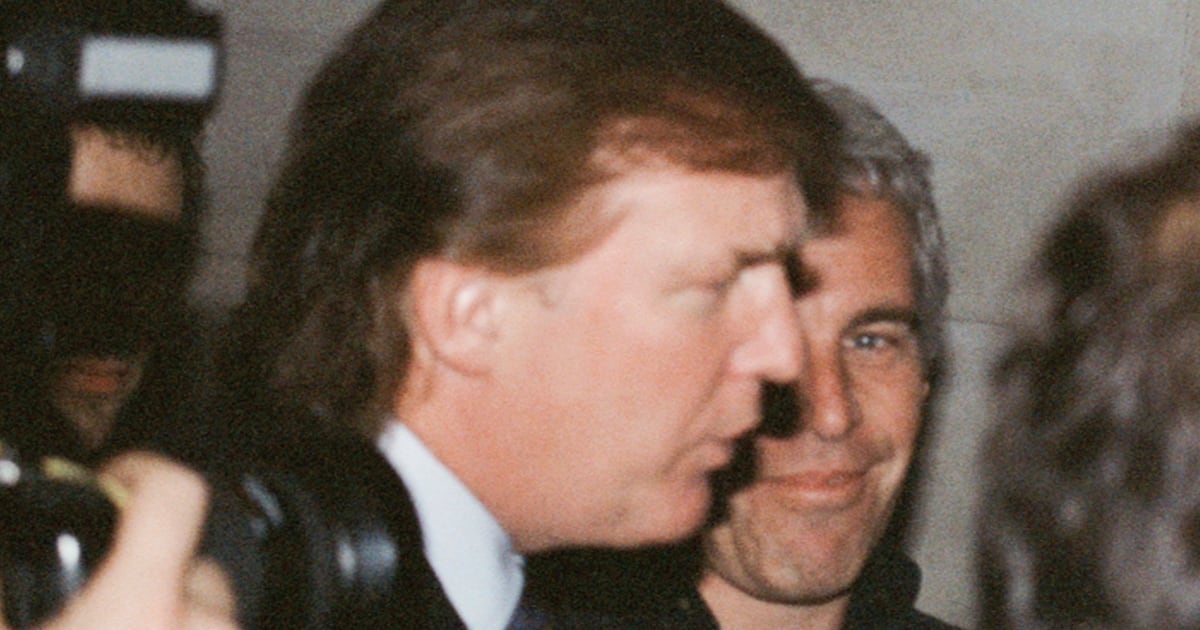
On Tuesday, Ted Stevens, the longest-serving Republican in Senate history, died in a plane crash. The Associated Press reports on the scene of the accident that took his life. “Former Senator Ted Stevens lay dead in the mangled fuselage of the plane,” according to its report, while nearby, 13-year-old William Phillips Jr. watched his father die. The four survivors, including former NASA chief Sean O’Keefe and his son, were forced to endure the Alaskan cold for hours with broken bones. Some rescuers credited their survival to the heavy-duty waders they were wearing (the passengers were embarking on a fishing trip); they helped protect them from the rain and cold as rescuers struggled against bad weather to reach the site. Of the survivors, Sean O’Keefe is the only one currently listed in critical condition.
The senator's death in a plane crash interrupted the rehabilitation of his image at home. Alexandra Gutierrez on his life after his tangle with the Justice Department.
When Ted Stevens left the Senate after representing Alaska for four decades, he was finally able to relax and be something he'd been all along: a friend. He was a "dear friend" to Sen. Lisa Murkowski and Colin Powell, a "respected friend" to George H.W. Bush, a "loyal friend" to Sen. Patty Murray of Washington, and just a plain friend to Secretary of the Interior Ken Salazar. Yesterday Gov. Sean Parnell called him a "personal friend to countless Alaskans" when he remembered the senator, who died in a plane crash on Monday evening.
He wasn't a disgraced, pork-obsessed senator in Alaska, the way he was seen in Washington. In Alaska, he was Uncle Ted, making sure the state's industries were doing all right and that everyone was cared for.
That's not an overstatement. The nickname "Uncle Ted" was deserved: He really was a personal friend to countless Alaskans. He pushed forward legislation that made Alaska natives a political force, created a system of sustainable fisheries, and authorized a pipeline to be built that would provide all Alaskans with an economic cushion. Making sure the state had money and was well cared for was his top priority, and people loved him for that. His ability to maintain an incredibly intimate and familiar relationship with the states' constituents and various industries was his greatest strength as a politician—and ultimately, his undoing.
On July 28, 2008, Stevens was indicted on seven counts of corruption for failing to report such gifts as home renovations and a sled dog from VECO Corporation, an Alaskan pipeline service and construction company. Three other state legislators had already had their careers ended because of a bribery scandal involving the company, and Stevens wouldn't fare any better. In October, he was found guilty on all counts and would lose his seat to Mark Begich, then mayor of Anchorage, the following week. He still maintained that he hadn't done anything wrong, and just five months later Attorney General Eric Holder cleared Stevens because of prosecutorial misconduct.
When that happened, Stevens had mostly retired from public life. There were no rallies or sly hints that he might run again, just a quick statement: "I always knew that there would be a day when the cloud that surrounded me would be removed. That day has finally come. It is unfortunate that an election was affected by proceedings now recognized as unfair."
And his post-trial days Alaska were indeed sunny. When he returned to the state, all his old friends were still there. While most of his time was spent working on his memoir or fishing, Stevens would make the occasional "rare public appearance"—infrequent enough that he wasn't in the papers more than a few times a year, but routine enough that the state's major outlets opened stories that way more than once.
Last Valentine's Day, Stevens attended a pro-resort development dinner in his home base of Girdwood, where Murkowski told him, "Since you have gone, things have gone to hell in a handbasket." The crowd roared. In April, shortly after his legal troubles came to an end, the United Fishermen of Alaska inducted him into their Seafood Hall of Fame. Stevens wasn't a controversial pick; by that point, the corruption charges seemed far from the commercial fishermen's mind—and his, too.
"I think he was just sort of glad to get it all over with and be with these people. I mean he had a lot of friends in the fishing industry, and he may have had them in the oil industry, too. I would not be surprised," says UFA President Joe Childers. "I mean, it was a very friendly place."
Stevens attended a renewable energy conference in August, and he delivered a speech to the Alaska Industry Support Alliance, an oil and mining trade group, in October, where he railed against environmental extremism and talked about the importance of oil development to Alaska's future. The speech was a hit.
"It was a very friendly audience. He's always been held in very high esteem by people in the oil industry in general, and our membership in particular. As I recall, he got something like two completely unsolicited standing ovations during his talk," says Paul Laird, AISA's general manager. "It was the first time that he had spoken publicly since the bogus charges against him were dropped by the Justice Department."
He wasn't a disgraced, pork-obsessed senator here like he was in some corners of Washington. In Alaska, he was Uncle Ted, making sure the state's industries were doing all right and that everyone was cared for. His was a tribal and almost ruthless approach to politics, but those in his tribe loved him for it.
"Ted Stevens was the single-most honest human being I've ever known," says Ronald Birch, president of an Alaska-focused lobbying group and Stevens' first chief of staff. "And I'm not saying that because you're writing an article, but because it's true. When he was first running for election, I told me we had a choice. Here's the best way to go politically, but I think this is better for Alaska. And his immediate response was, ‘The hell with politics—do what's right for Alaska.'"
That became Stevens' slogan, and he repeated those words during his farewell speech on the Senate floor. But back to Stevens' beginnings: those fighting words also ended up engraved on cuff links given to supporters of his campaign, and are still cherished tokens by those who stood behind him from Day One.
"They're one of my most treasured possessions," says Birch. "Did those words rub people the wrong way sometimes? Yeah. Did it make him abrasive? Yeah. But did it do a lot for Alaska? Alaska wouldn't look the way it does today without Ted Stevens."
In any other case, those would be weird words coming from a lobbyist. But in Ted Stevens' Alaska, staff members were lobbyists, lobbyists were business partners, and business partners were friends. When he accepted gifts from VECO, he was accepting gifts from his friends. That this relationship should be criticized and called corrupt is more than fair, but it was also easy to believe Stevens was being honest—at least with himself—when he said that he was innocent.
The irony is not lost in the fact that Stevens died on a plane owned by communications company GCI that's basically rural Alaska's Telmex and was accompanied by a NASA official turned defense firm CEO. Maybe it's sort of appropriate that Stevens died on the way to a corporate retreat. But maybe it's more fitting that he died with his friends.
"If he was going to choose a way to pass on, being in a Bristol Bay drainage up around Aleknagik with friends on a float plane wouldn't have been far off, I think," says Childers. "He loved Alaska, and that's a beautiful part of Alaska."
Alexandra Gutierrez is a reporter based in the Aleutian Islands and a columnist for Pacific Fishing. She has contributed to Alaska Public Radio Network, The American Prospect , The Economist online, and The World.






